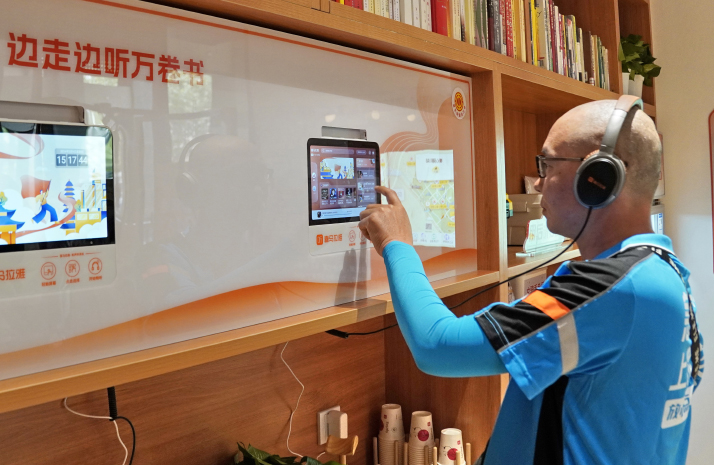| China |
| Outdoor workers find solace in smart rest stations | |
|
|
 Two delivery workers take a break at a smart rest station in Chaoyang District, on May 11 (XINHUA)
In the scorching summer heat, packs of office workers are seen rushing through the streets of Beijing, even more hastily than usual. It's just too hot to hang around outside. During the dog days, most people prefer to stay inside the air-conditioned cool of their office. If they wish to order anything, from food and beverages to office supplies or whatever their heart may desire in that moment, a few taps of their mobile phone screen suffice, courtesy of China's thriving delivery business. However, those delivering the items have to work outdoors, rain or shine, in searing summer heat or bitter winter cold. Recently, smart rest stations have mushroomed, sheltering outdoor workers, including delivery people, construction workers and street sweepers, from extreme weather and fatigue. "Our peak time usually occurs between 10:30 a.m. and 3:30 p.m. because that is when most people will order lunch or afternoon tea. But it's also the hottest time of day," a delivery worker surnamed Wang told Beijing Review. "So cooling off for one hour, from 4 p.m. to 5 p.m., at a smart rest station has become part of my routine. Without the station, I would have been exhausted this summer." Wang's favorite rest station is located inside a branch of the Industrial and Commercial Bank of China, one of the country's "Big Four" state-owned banks, in Beijing's Xicheng District. In addition to air-conditioning, the station also provides Wi-Fi, mobile phone chargers, bottled drinks, snacks, towels, general medication, umbrellas and ample space to rest. Most of these products and services are either available free of charge or extremely cheap as long as the user is legally registered as an outdoor worker. "Some bigger stations even have microwaves, refrigerators, printers and (audio) books," Wang said. Most of his co-workers can now reach a nearby station within a 15-minute electric scooter ride, something Wang believes to be of great importance in preventing heatstroke, dehydration and overall burn-out.  A delivery worker listens to an audiobook at an intelligent rest station in Chaoyang District, Beijing, on May 11 (XINHUA)
Sharing is caring The rest stations were set up by local branches of the All-China Federation of Trade Unions (ACFTU), the country's leading body of trade unions. Last July, the ACFTU launched the "Double 15 Project," proposing to set up 150,000 rest stations nationwide by the end of 2023. The project aimed to create enough stations so that outdoor workers could reach one within a 15-minute walk in major cities and key urban hubs across the country. Most stations were set up in collaboration with widely distributed public institutions such as banks, post offices, community centers, libraries and Internet service providers. Many suburban areas also chose to construct independent stations. According to an ACFTU report released in late 2023, China had thus far built 184,200 stations, providing services for 147 million workers and serving a daily average of 3.27 million outdoor workers. Basic services aside, some stations have now extended their offerings by, for example, teaming up with local communities to organize activities such as providing free meals to outdoor workers, staging cultural performances, and hosting free lectures. Doing so further supports outdoor workers and enriches their cultural lives. To make life more convenient for outdoor workers working long hours, the provincial-level trade union of Guangdong Province in south China has even offered help so that they can apply for public services at the stations. The workers can deposit their application documents at an electronic cabinet inside the station, and then select the type of service they require. This can range from registering their households or vehicles to updating their social insurance; volunteers then oversee the proceedings. Upon completion, applicants will receive a notification via mobile phone and can then retrieve their documents. "Most outdoor workers need to work during the office hours of government departments," an official from the Guangdong union told news portal Worker.cn. "In this way, the outdoor workers don't need to spend their valuable working hours dealing with lengthy application procedures." Hi-tech management With the rapid spread of permanent rest stations and plans already in place to build more such stations, more and more of the ACFTU's local branches are now applying cutting-edge technology to reduce the human resources cost of the stations while guaranteeing service quality. "Beijing alone features more than 1,200 rest stations that provide outdoor workers with 24/7 service," Zhang Liang, Vice President of the Beijing Federation of Trade Unions, said at a press conference on July 26, adding that artificial intelligence (AI) is widely applied to manage stations and their services. AI enables the station to run without human staff all day long. The technology is used in many ways, including access control, monitoring and remote sensing. Outdoor workers can enter the station by scanning a QR code via Weixin (a ubiquitous super app in China). The system will then automatically open the door and turn on the lights, at the same time voicing instructions for any services users require. Facial and voice recognition technologies are used for making payments and unlocking cabinets, and AI-powered devices are used for delivering products and answering workers' questions. Plus, AI allows for the remote management of the station by sending updates and alarms in certain situations, as well as sending out signals to clean the station. In addition to cutting down costs and improving service quality, the application of AI has extended the service time of many rest stations from eight to 10 hours per day to 24/7. Therefore, many provinces are stepping up efforts to make more of these stations "smarter." "We sometimes have to work evening or night shifts; knowing there's a smart station nearby reassures us," Wang said. "It feels like you have a second, mobile home in this metropolis. Whenever I get to a station in the pitch-black darkness of night, it will light up to welcome me." (Print edition title: Beat the Heat) Copyedited by Elsbeth van Paridon Comments to zhangyage@cicgamericas.com |
|
||||||||||||||||||||||||||||
|